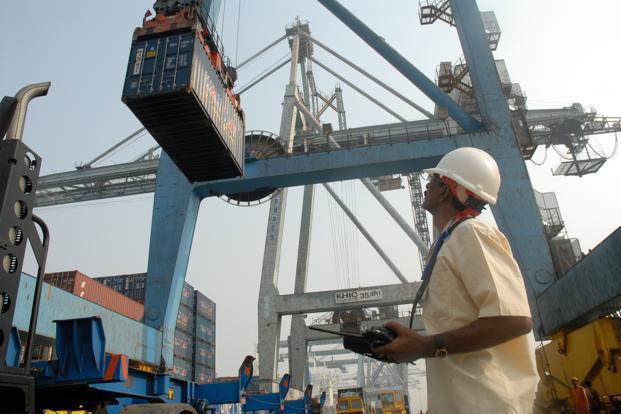Port Workers in Kolkata Threaten Stiff Resistance to Any Intention to Sell off Ports

Image Courtesy: Mint
Prabir Sarkar, General Secretary, Calcutta Port and Shore Majdoor Union, while talking to Newsclick said that "The path that the Union Government has chosen, that is, to offload India's strategic assets, like the ports, to private hands, will lead to huge friction between workers and the government in this sector too. If the Government goes ahead with its idea of a National Monetization pipeline in this sector then like that happened in the steel and coal sector, here too along with our family members and neighbourhood people we will build up stiff resistance so that private players cannot come and take part in an auction of Port assets in Kolkata"
Sarkar's stern warning, who is also a labour trustee of the Calcutta Port, comes a day after the organization held a meeting in the Calcutta port premises against the intention to sell off berths of Kolkata port to private players for the monetization of Port assets. “At first we had thought that the aim of privatization of the Port premises in the country is intended to offload the diamond priced lands in the major cities of the country where these ports are located as civilization is centered around the ports." The Calcutta port has got 11,000 acres of land in the vicinity of ports in Kolkata and Haldia whose market value exceeds nearly lakhs of crores in real estate money. Throughout the country, there are 69,000 acres of land in the vicinity of major ports of the country, including Mumbai, Kolkata, Vizag, Ttutikorin, and Kochi.
Before bringing the policy of the National Monetization Pipeline, the Modi Government had also changed the Major ports acts of 1963, which was more welfare-oriented. Through the new act, the system of trusts was abolished to make way for new authority. Post-1991, when the neoliberal regime was ushered in the country, new recruitment was closed in the ports, and equipment purchases were stopped.
Now work is being offloaded to third-party service providers while scale rates are prepared by the Port trusts. For example, as per the Calcutta Port Trust, the charge to offload a 40 feet container is 2,300 rupees, the service providers get Rs 1,800 as service charges for the same. The rate chart is prepared by the Port Trusts and approved by the Tariff Authority of India.
According to the proposal, the scale rates will now be prepared by service providers themselves. This will lead to uneven competition, causing largescale retrenchments due to automation. Low-paid workers without social security will be employed as port workers. The agreements are such that private players do not have to invest a penny in infrastructure development of the ports, rather they will try to cut costs by using the infrastructure prepared by the port trust. It was along these lines that BSNL reaped its assets in the past.
The ports of Vizag, Mumbai, and Kolkata are bases for naval ship maintenance. Giving land to private hands will mean a stiff compromise with defense interests. Earlier, excess lands in the port trust area were offloaded to Coal steel and Petroleum PSUs at an appropriate rate and more leverage was given to those PSUs that were utilizing the port services.
Right from 2014, the Port and Shore Majdoor Union led by the Water transport federation of India (WTWFI), is engaged in struggle against the same. Sarkar pointed out that even the parliamentary standing committee report has been rejected by the government in its urge to privatize. The Kolkata port, which saw the work of nearly 53,000 workers post-independence, is now home to 4,000 permanent workers and 3,000 casual workers.
Debanjan Chakraborty, CITU Kolkata district Secretary, told Newsclick "The entire Port network of the country is a place of cheap handling for port services for the carriage of liquid petroleum to goods traffic in the country .. even foreign ships offload their cargo throughout the port network at extremely low charges and if these go on there will be a fire raging on the regular food items as freight charges will treble under private hands."
"Inflation will grow at a rapid pace. Many shipments that are now being done through the government-owned dock system and Calcutta Port trust and are of strategic nature, will face an immense problem. CITU has decided to desist these proposals under any cost" Chakraborty added. He reiterated that once materialized it will pave way for huge retrenchments.
Get the latest reports & analysis with people's perspective on Protests, movements & deep analytical videos, discussions of the current affairs in your Telegram app. Subscribe to NewsClick's Telegram channel & get Real-Time updates on stories, as they get published on our website.
























